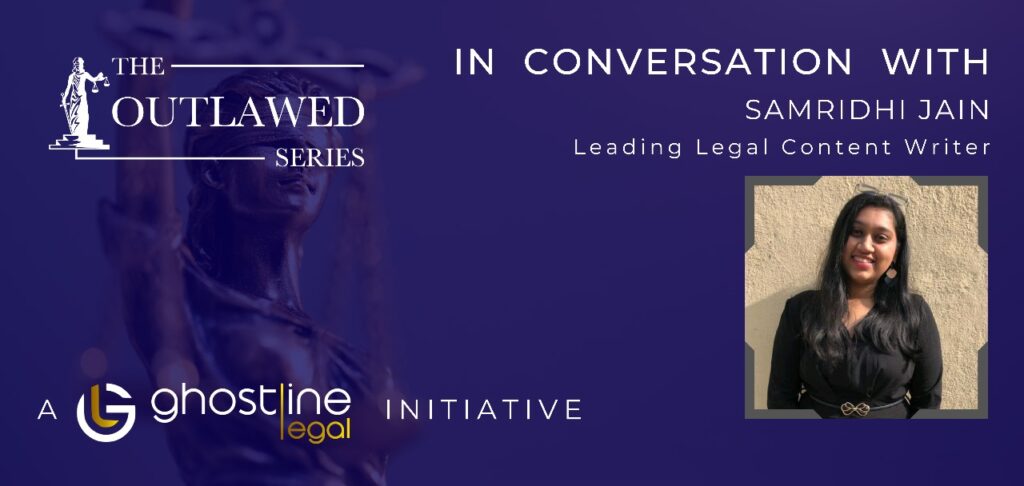Samridhi Jain is a legal content and copywriter and a contracts enthusiast. She works with legal technology companies, law firms, and legal professionals from over 7 countries. She has 3 years of experience building and executing marketing strategies from scratch, creating content assets for websites, and writing copy that has generated more demo requests.
She has written for clients in CLM, document automation, contract review, matter management, eDiscovery, intake, e-Billing, productivity software, and more.She enjoys simplifying the complex and has also worked on numerous legal design projects.
1. How did you stumble upon legal tech as a content writer?
Samridhi: I started my freelancing journey back in December 2020. I started working for a US based podcast, “Tiny Leaps, Big Changes,” in the personal development space. After that, I started publishing my legal articles on LinkedIn and law firm partners, legal marketing consultants and legal professionals started approaching me to write content for them and build marketing strategies. I was excited to explore these opportunities. I went right in. After 8-10 months, a legal tech founder messaged me. Soon after, I started marketing specifically for legal tech companies. Sharing helpful, actionable and experiential content on LinkedIn helps me attract these founders and companies. I never intended to write or work in legal tech. It just found me—because I decided to put myself out there.
2. What were and how did you deal with the initial challenges in this field?
Samridhi: When that founder messaged me, I had just seen people throwing the word “legal tech” around. I had some idea but had the fears anyone would have. But an opportunity doesn’t present itself to you if you aren’t ready for it. I strongly believe in that. Well, what happened then? I dug up the internet—from articles, LinkedIn posts to YouTube videos and podcasts, which, mind you— weren’t as plentiful as there are now—and became curious about everything legal tech.
The biggest challenge was what was right or rather, who was right? Even though there weren’t as many resources, it was still overwhelming. Now when I think about it, no one was wrong about it. There are just multiple ways of describing and delving into legal tech.
Another significant challenge was absolutely zero structure while I was learning. Maybe it was a blessing in disguise but I learnt while I worked with multiple legal tech leaders and from some of the most incredible entrepreneurial minds. I’m glad I had the opportunity to work with multiple tools and be a part of the behind the scenes. I combined my marketing skills with whatever I was learning about legal tech and lawyer psychology to translate that to tangible outcomes for my clients.
3. What excites you most about legal tech?
Samridhi: The sheer possibilities that it opens up for the future of the legal profession. What’s most exciting is in the next five years, a qualified lawyer’s job title could be anything from e-discovery specialist, contract manager, legal operator, CEO, legal marketer to legal engineer, outsourced counsel, lawyer coach and everything in between. Today’s law students need to be shown how much they can do beyond law firms, government roles or companies. You choose from what you have because you haven’t been told there’s more. And the best part is, you can always create a new role.
Another thing is the stage legal tech is at right now, globally, is interesting—there’s some maturity in the market as people are challenging ideas and products and we’re seeing some of them tank as the ones on stronger footing are rising. What matters when it comes to a legal tech product is its ability to truly remove a big hurdle in its users’ lives. I’m pumped to see how companies become more empathetic towards solving problems in the legal industry one idea at a time instead of jumping onto the hype.
4. Given how conservative the legal profession in India is, do you think India has welcomed Legal Tech?
Samridhi: I’ve seen mixed reactions. I’ve met people at conferences that have completely rejected the idea of having legal tech while others have welcomed this new change and in fact are building for the Indian legal industry.
I’ve seen law students who are curious but they’re also considering it to be flashy. People confuse legal tech with technology law. While they are far apart, I certainly see people in my network discussing legal tech. I’m hoping more and more students and practicing lawyers bring this into their daily conversations. India has a few successful legal tech companies and a lot of them are on the rise. Indian legal tech will only be welcomed when builders become educators. What I mean is that you can’t push products into a market that’s not mature enough to accept it. Instead, you lead the way.
5. What are some key areas in which legal tech can help advocates and law firms?
Samridhi: 1] Matter management
Law firms can use a tool to streamline workflows. Matter management tools can help law firms optimize document management, scheduling, client onboarding, case research, billing and invoicing and cross functional collaboration. Instead of working with processes that create more friction, a simple management tool can streamline this process. Law firms and advocates deal with multiple matters at the same time so this can help them get a bird’s eye view of every single case and stay in the know.
2] Contract Review
Law firms deal with a multitude of contracts on a daily basis. Having a playbook installed within a software so that it reviews contracts can speed up the process. Not only that, as it reviews more contracts and with more direction from its users, it gets better.
3] eDiscovery
Finding evidence in this digital world is like finding a needle in a haystack. Discovery tools sort data and make it searchable within user-friendly interfaces, helping lawyers get to the point. The best part is being able to alter the scope of a project and not look through things manually.
Apart from these, law firms can use full-blown CLM tools, productivity software, due diligence tools and more.
6. How do you think legal tech in India will evolve with time?
Samridhi: What I wish is that it matures in a way that caters to specific Indian legal system problems. Of Course you cannot stop people from having a global approach but I hope entrepreneurs take an interest in solving legal problems in India. We’re only becoming global but the Indian legal system, just like any other, faces unique problems that can’t be solved if founders do the classic copy-paste-from-what’s-worked-in-other-countries.
How I think it will evolve in the upcoming two to three years is that the divide of adopting legal tech will increase. There will be two extremes where one group will reject the idea of bringing tech into the “noble” profession of law while the other group catches up and builds technology that will change the way the legal profession looks.
7. What impact does being on social media have for a legal professional and how do you see that changing?
Samridhi: LinkedIn changed my life. The reason you’re reading this interview is because I decided to put myself out there. And I’ve always encouraged more and more legal professionals to share their story online. Every experience you’ve had is a story and social media is a place where we can be ourselves and find our tribe.
Not too many lawyers consider social media for their practice for whatever the reasons may be but it doesn’t matter if you believe it or not— we’re all connected online and we have more people joining the party everyday.
I know legal professionals that say that social media changed their career trajectory for the better. They got opportunities to speak at conferences, co-author books, hold sessions, start side hustles, and share their stories which inturn inspired the young legal folks to take action. And the only place this is going is up. We’re going to see more and more legal professionals on social media—telling their stories, speaking their truth and changing the legal profession for the better—one post at a time.
8. When it comes to marketing legal tech companies, what has your approach been?
Samridhi: My approach changes with the company I’m dealing with. Marketing strategies will be different for companies in their launch, growth, and developed stages. A lot of companies are merging and some are re-branding and marketing changes with that. I always say that companies should grow organically and reach their potential users without adding upfront money into the process. What it means is creating content online instead of pushing ads on people’s feeds. More than content, it’s about building relationships. People want to do business with people and if you can’t be more than a salesperson, it just got a lot harder to sell.
I’m a writer but when I work with companies, I’m not one. I’m a partner. I care about their clients, their business, and their ambitions. Because if I can’t, what’s the point? I never just write an article. I never just write a case study. There’s a strategy, a goal and a clear vision behind it. There’s a reason a marketing activity is taking place and I don’t like to take my eyes off the results. The way I run my business is I expect to increase someone else’s.
9. What are some marketing mistakes that legal tech companies should avoid?
Samridhi: 3 things:
Stop going in all directions at once. If you chose LinkedIn, stick to it for at least 8 months. Don’t try to do Twitter, Instagram and LinkedIn at the same time.
Just because something gets you answers in the short term, doesn’t mean it does for the long term. Play the long-term game. Cold emails or pitches work—not just short-term but long-term too. But, relationships work all the time.
Marketing can only amplify how amazing the product is. It cannot make it amazing. That’s one important distinction most founders don’t appreciate.
10. As a legal writing professional, how do you work with clients so they have the best experience?
Samridhi: I have a 3 step simple process. First, I get on calls with most of my potential clients and we go through their pain points in detail. I make sure I provide as much value as I can during this call.
Second, we follow up as required and discuss the final pieces of a project.
The final step is for me to go through all the information the client has sent over to me, do in-depth research, read their pitch deck, understand their vision, research their website and go through all the relevant items like demos, customer feedback, and client stories among other things.
11. What are your plans going forward?
Samridhi: I’ve been thinking about starting an agency or maybe a company. It’s all in the works. I certainly see myself sharing a lot more on LinkedIn and in ways I haven’t before so if you’d like to learn more about my journey or catch up, say hi on LinkedIn!
Ghostline Legal is India’s first full-service BCI-compliant tech firm for litigation chambers and law firms. Check our services HERE.








